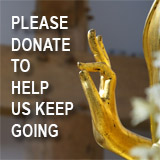The temple has a history as a center for mass political gatherings, and was a focus for Buddhist monks and pro-democracy protesters last September.
Tuesday's attempted suicide occurred at a time when the authorities have tightened security in Yangon and other cities to try to prevent any protests this month marking the first anniversary of the anti-government demonstrations.
Those protests were initially small, consisting of people complaining that the military government had failed to ease their economic burdens. They later turned into broader anti-government demonstrations, led by militant monks and brought as many as 100,000 people out into the streets on Yangon, the country's biggest city.
The army eventually stepped in to quash the peaceful protests by force, killing at least 31 people and detaining hundreds.
The monk who tried to take his life Tuesday was brought to Yangon General Hospital, said witnesses, who asked not to be named so as not to draw the attention of the country's military authorities.
"The monk said he tried to kill himself because he was desperate. He said he came to Yangon to take medical treatment and he ran out of money," according to the trustee, who also asked for anonymity.
The trustee said the monk, whose name has not been released, was in stable condition.
In March, 26-year-old Kyaw Zin Naing set himself on fire at the temple after shouting anti-government slogans, according to witnesses. He died later of burn injuries.
Witnesses to Tuesday's suicide attempt did not hear the monk shout any anti-government slogans.
Another politically significant anniversary is being marked this week. On Sept. 18, 1988, the army intervened to smash massive pro-democracy demonstrations and grab absolute power from a weak interim government, suspending the constitution.





